While we know 2006 is extraordinary with films like Rang De Basanti, Fanaa, Krrish, Omkara, Gangster, Kabhi Alvida Naa Kehna, Lage Raho Munnabhai, Dor and Khosla Ka Ghosla, the question is what was the filmi climate of 1978 like? |
Bachchan has always rocked in confrontation scenes. Be it the legendary bhai vs bhai scenes of Deewar or baap vs beta scenes of Shakti. In Yash Chopra's Trishul also, he found his match in a battle of arrogance, wits and self-respect in the intimidating persona of Sanjeev Kumar. From a penniless youngster trying to prove a point to a conceited, veteran businessman to a flourishing tycoon who has achieved that aim, AB with his simmering aggression demonstrated the versatility of his anger to his faithful audience. Bachchan took a break from playing lovelorn and jilted to become the stylish, maverick, iconic hero of first-time director Chandra Barot in Don. His cool and crazy antics, prominently exhibited in heavy-duty Salim-Javed one-liners and catchy Kalyanji-Anandji songs, were a clear winner. Definitely good enough to spawn a remake 28 years down the line. |
Shalimar, an East-meets-West collaboration was touted to be the Next Best Thing. But its damp squib performance left its lead Dharmendra and many other sorely disappointed. Technically, Mukta Arts was yet to come in picture. But Subhash Ghai's follow up to Kalicharan -- Vishwanath, starring a livewire Shatrughan Sinha -- lived up to the expectations. The seeds of a budding showman were sown. Subsequent years and films like Hero, Karma and Ram Lakhan would establish this possibility into reality. |
It was time to play dutiful wifey yet again for Nutan; but this time to a deceased hubby in Sawaan Kumar Tak's tearjerker drama, Saajan Bina Suhagan. By then, the legendary actor was sleepwalking through such roles. At that time, Ghar came like a breath of fresh air amidst these suffocating portrayals of the 'ideal' woman. Sensitive and realistic, Ghar which dealt with rape and its aftermath on the psyche of a married victim, was laced with Manik Chatterjee's keen direction, Dinesh Thakur's compelling narrative, Gulzar's lilting poetry, Rahul Dev Burman's enchanting score and superlative performances from Rekha and Vinod Mehra. |
Junoon delicately illustrated the intricacy of human relationships and behaviour in the face of 1857's mutiny and its repercussions on a hapless English mother-daughter, also a target of an obsessed Nawab's affections duo holding on to their dear lives. These two belong on the collector's item shelf of any cinema enthusiast. |
Khayyam's rich melodies for Trishul, including, Mohabbat bade kaam ki cheez hai and Jab bhi milte, worked like a charm on the senses. Ravindra Jain's mushy title composition for Aankhiyon Ke Jharoke Se enjoyed tremendous airplay. |
Here's a quick look at who won what circa 1978: Best film: Main Tulsi Tere Aangan Ki |
Farhan, his dad and the Don
 |
It airs on television every other day; video stores report a run on copies. It is, at one time, the most-watched movie of recent days and the most eagerly awaited film of the year.
It is Don -- and even as the 1978 Amitabh-starrer directed by Chandra Barot airs on television screens and flies off store shelves, the 2006 version starring Shah Rukh Khan and directed by Farhan Akhtar counts down to release.
Naysayers continue to berate the film and to suggest that imagining any Don other than Amitabh is blasphemy; meanwhile, an entire generation born after the cult classic hit the screen queues up in theatres, and logs on to the net, for advance bookings.
"I'm not the torchbearer of the remake brigade," Akthar says -- but his decision to remake the classic film has sparked a slew of remakes that threaten to become the next big Bollywood trend.
Farhan sat down with dad Javed Akhtar -- who wrote the original film with Salim Khan -- at the latter's Juhu home; together, they revisited the old Don and unraveled the new.
In a living room scattered with high art, and facing French windows that open onto a sea view to die for, the cult-creating father and maverick son talk Prem Panicker and Raja Sen through their respective films, their creative impulses.The first of a three-part interview:
Farhan, you started with a light, preppy film on friendship; then you made a coming of age, redemption-type film against the backdrop of war. Now you are remaking an iconic film about gangs and gangsters. What is the common creative thread, the identifiable signature that runs through your creativity?
Farhan: I would credit it to some kind of creative instinct that makes me move on to whatever it is that comes next, with the gusto I bring to it. But I think that probably what you could see as similar between the three is that all of them are films that have been made one way or the other, in the popular genre, before I made them.
Dil Chahta Hai is not the first film about friendship. Lakshya is not the first film about war and coming of age. Similarly, Don is not the first gangster film -- and it is a remake in any case.
I think what they have in common is a different, individual take from what you would normally associate with that kind of film.
So is it a case of you coming across a storyline that has been dealt with in a particular fashion, being dissatisfied with the treatment, thinking if you had done this, you would have done it differently -' and then following through on that impulse?
Farhan: No, it is not dissatisfaction. It is more the excitement of getting a chance to do it the way you want to. There is no dissatisfaction -- I love movies, I've seen so many movies, like Don, for example -' there is nothing wrong with the original, it is fantastic the way it is, and that is exactly why I am so excited to remake it.
Of all Javed-saab's iconic creations, why was Don the film that jumped out at you and said, remake me?
Farhan: I think Don is the one film from that time that in my mind lends itself to being remade today. For me, it is a film that back then was a little ahead of its time. I don't say so technically '- not the way it was shot, or the sets, or whatever. But the way the story was told, the language the characters spoke, the writing style there was, it was very modern even for its time. So today, when you adapt it, it fits very easily into a contemporary space.
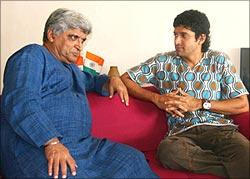 Like, I love Deewar, Sholay, Trishul, Zanjeer, so many other films of the time -- but if you remake those films today, they will be dated. Also, Sholay has been remade -- not officially remade, but remade, so many times. Deewar has been remade so many times, Trishul has been remade so many times. But Don -- no one has gone into this area as often as they have gone into these other movies, and I think it fits into the modern sensibility of movie viewing quite well.
Like, I love Deewar, Sholay, Trishul, Zanjeer, so many other films of the time -- but if you remake those films today, they will be dated. Also, Sholay has been remade -- not officially remade, but remade, so many times. Deewar has been remade so many times, Trishul has been remade so many times. But Don -- no one has gone into this area as often as they have gone into these other movies, and I think it fits into the modern sensibility of movie viewing quite well.
Javed-saab, if you were picking a movie of yours to be remade, would it have been Don?
Javed: Perhaps not. I see what Farhan's point is, and it is totally valid, it is a good point. But if I had to chose from my own films, I would pick one that after writing it and after watching it on screen, I felt oh god, I should have done this or that. So I would like to remake it, rewrite it to mend that mistake.As a writer I don't have a problem with Don, so why would I want to remake it?
So which movie would you have remade?
Javed: Kaala Patthar, Arjun, Mashaal, Aakhri Jung -- these were the films I would like to remake because I feel they were very good films; they were very good plots, they were very interesting characters. But somewhere, I missed the bus as a writer, especially in the second half. The mistakes were minor, but it could have been corrected.If I had taken one avenue instead of another, those films could have been much better.
Don is a totemic movie, an iconic character We've all seen the film, we have at the time tried to walk like Don, talk like Don, copy the whole Don cool. In that sense, a lot of us have an indelible reference point with that film. Is that a potential problem for your re-imagining?
Farhan: There are two answers to this. Before you see the movie is the first answer, and after you see the movie is the second answer. When I started writing it, the first thing that I did was write down all the things I remember very clearly, as highlights, from the original Don.
For me, the excitement of remaking it was a fan's excitement; that is how I wanted to approach this. All of us have such mental lists, points of reference -- so when someone sees the film, he has to go thank god, that bit that I loved in the original is there.
So I made that list. And then I tried to weave the story around that. While doing that, there were things that weren't fitting into the narrative, so I had to sacrifice those. So the upshot was, when you see the movie, you realize it is more a fan's take on the film, rather than a filmmaker's.
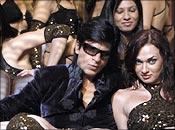 And then -- this is the second answer I mentioned -- you realise after seeing the film that your point of reference for Don, the character, is not going to be applicable to this Don, because this is a different character. He may say the same lines, but he is not the same Don.
And then -- this is the second answer I mentioned -- you realise after seeing the film that your point of reference for Don, the character, is not going to be applicable to this Don, because this is a different character. He may say the same lines, but he is not the same Don.
Whoever has seen the movie -- with the exception of Pa, who is sitting right here and who is so very close to the film -- has not mentioned the earlier Don to me. No one has come to me and said this was better or that was better; Shah Rukh was better or Mr Bachchan was better.
Those who have seen the movie have only spoken about the film, because by the end it is a completely different film, so you forget to compare -- actually, you don't have a need to compare. You come out without thinking of the original movie -- in that sense, your point of reference has changed. You don't get into comparison, because they are two different movies that happen to begin with a common premise.
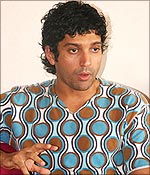 |
With a couple of days to go before his third film Don releases worldwide, director Farhan Akhtar sat down with his legendary Pa Javed Akhtar -- who wrote the original film with Salim Khan -- at the latter's Juhu home; together, they revisited the old Don and unraveled the new in an exclusive and exhaustive interview with Prem Panicker and Raja Sen.
So the 'remake' bit is only during its making, it is valid only till the theatre goes dark and the movie begins -- and then it is a whole other movie?
Farhan: When the picture starts, you are seeing the remake, and that is true until some point when the whole thing changes, and you begin seeing an entirely new film. Even within that new movie, there are points of reference that you will recognise from the earlier one, but at some point it is a totally different story. You will know what the differences are, but you won't stop to think about them.
The character's dilemma is the same, the plot is the same, the conflict is the same, but what transpires across all of that is different.
You've made a new Don but you've hugely referenced the old one, haven't you? Scenes, situations, dialogues, even a song or two -- you keep bringing back references; you are not shying away from the old Don.
Farhan: Of course not -- I am not for even one moment shying away from the old Don. Apart from the fact that I love that movie, the reason why I am remaking it, reimagining it, is because of how fantastic the first movie was.
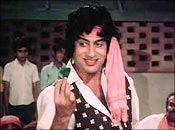 So it is your tribute to a much-loved film.
So it is your tribute to a much-loved film.
Farhan: At some level, of course yes. It is a tribute, not just to that film, but to that time, to the films Pa and Salim uncle (Salim Khan, who co-wrote Don with Javed Akhtar) and Mr Bachchan made. The movies they made at the time have had an amazing impression on me, a deep impression, and this is my way of harking back to that time and publicly saying yeah, these movies did mean a lot to me.
Leaving the movie aside for a moment, what is it about Don, the character, that appeals to you; that makes you want to tell his story?
Farhan: It is always fascinating to see how a twisted mind works. We see good people on the screen all the time -- and the trouble with good people is they are not multi-dimensional. We see them as a good person and they remain a good person for the rest of the film; nothing can change them, nothing will ever happen to them, what they have decided to do they will do. But to have a mind that can keep changing, to deal with a mind that is dark, to create that kind of a character and then to tell his story, that is really fascinating.
Javed-saab, what was your mindset when you conceived Don?
Javed: At first, it was not about the character -- we thought that it was a very interesting plot. To begin with, it was about this man who was planted by a police officer in a gang because he resembles the dead criminal. And then the only man who knows he has planted this person, the only one who knows this man in the Don's clothes is innocent, dies -- so for the world, not just for the gang, this innocent person is actually a Don.
So now this man is in deep trouble. This twist was interesting, and to begin with we had only this twist. And then we evolved the whole screenplay around it. The creative spark was this impossible situation -- tala bandh, chabhi phenk di, so now what will happen? How will this person unlock himself?
'You'll never think Kareena is cheap'
 Farhan Akhtar |
When Farhan Akhtar set out to remake Don, based on a film co-written by Javed Akhtar (with Salim Khan), he knew there would be a lot of reimagining involved.
In the third part of our exclusive feature where Farhan and Javed Akhtar sit back and talk Don with Prem Panicker and Raja Sen, the discussion moves to the importance of casting.
Don, especially when compared with the films of that time, is unusual in that it is a very lean, low-fat film. Things move along very rapidly, almost rushed -- like, the impostor learning to walk like Don is just one scene, Roma's learning martial arts, they are all single scenes. Also, there is no comedic element, no extraneous stuff. Was that how you planned it; was it deliberate?
Javed: I remember when the film was released, someone from the film industry remarked that the whole film looks like a trailer. The tempo, especially for those times, was frantic.
Don remains an interesting film for me because unlike other films that have done well in the box office, Don is perhaps the only example in Hindi cinema that has done extremely well at the box office without any family sentiments, without getting into traditional melodrama, putting 'sentiment' into the plot.
Even where there is a possibility, like say between Pran's character and his children, for instance, one did not indulge in it at all.
Was that conscious?
Javed: Oh yes, because tempo was the key; that was the prime concern. So perhaps Don was perhaps the only caper movie ever made in this country that had no other emotions at all. None of the 'Hindustani' requirements were present at all -- and yet the film did well.
Perhaps that is why Farhan feels that this film is more conducive for a remake -' because by this time, those elements, what I can only call Hindi picture requirements, have become almost obsolete, trite. So perhaps that is why Don is more suited to today's palate than some other pictures that were appreciated in their time.
On another note, you were asking Farhan about his films and the linkages between them. In a way it is paradoxical -- if an artist, who is a writer, director, whatever, doesn't have versatility that is a handicap. You have to have the prowess, the capability, to do different things.
But by the same token, if you don't have the style, a recognisable signature, if every time you are totally different, and the audience cannot identify your style, then it becomes a problem. So in that sense, the problem for creative people like Farhan is how to resolve this paradox; how to create and sustain a signature, a style, while avoiding the trap of being repetitious.
Maybe Farhan has made one film about friendship -' but I don't think this kind of friendship, this kind of ethos, was ever seen in our movies before Farhan made Dil Chahta Hai. And that made Dil Chahta Hai a very important film.
Then he made a picture about war, and about a young man who is in the process of becoming a Man, and then he has made this picture. On one level, they are very different from each other. But on another level -- and I have seen Don, so I can talk about that too -- they have his feel; there are certain aesthetics, there is a certain sense of decency, of cinematic excellence, that is the common thread in all three of his pictures.
There have been directors who have always made a movie in one genre, like say Hitchcock, and become known for that. Then there have been directors like say William Wyler -- the man who made Ben Hur also made Funny Girl; the man who made Funny Girl made Desperate Hours; the man who made that movie made How to Steal a Million; the same man made Big Country, a Western film -- but every time, you could identify that it is a William Wyler film, in spite of his constantly changing genres.
So I think even when directors and writers change their genre, their sense of aesthetics, their sense of decency, their sense of morality will always be common to all that they do. In that sense, take a director with say certain crude values, let him make a historical film, or a contemporary film, or a comedy, or a family drama -' that crudity will travel with him across genres, it will be his trademark.
In the same way, if a director has a certain sense of decency, aesthetics, certain trademarks, then whatever films he makes, you will see that signature. Even when he makes a film about crude characters, you will see that sense of decency underlying what he does. So I think Farhan has certain aesthetics, decency, discretion, which is common in all these films.
Hrithik Roshan told one of my colleagues, Farhan, that he is damn glad you are at least one day older than him, because you intimidate him...
Javed: You are older than Hrithik?
Farhan: Exactly one day older.
Javed: He doesn't look that young!
*shared laughter*
The point Hrithik was making was that you have a firm grasp of the medium and two, that you know exactly what you want and who can give it to you, and you will not settle for less. What is it about your formative years that gave you this grasp, this control? How did it happen that in terms of cinema you are way ahead of your years?
Farhan: When I was young, I used to lie a lot, and I used to really believe my lies. There were very few people who could see through my lies -' my Pa was one of the few.
Javed: Creative people are liars by nature.
Farhan: Right. And I was extremely addicted to my lies; I would make sure that people believed it. At the end of the day, film to some extent is about you creating a lie you want the audience to believe, and how good you are as a creator depends on how good you are at making people believe the lies you tell them. So I guess that thing about lying when I was growing up was my training ground. I've stopped doing that otherwise, now I channel all my lying into my movies.
The other thing people mention about you is your knack of building the right team for each movie. Like Mohanan on the camera for Don, for instance -' when you signed him on, no one knew anything of him; no one would have put him in a list of top cinematographers like say a PC Sriram, a Santosh Sivan, a Madhu Ambat, Jeeva, KV Anand, Thiru... Yet you pick this tyro, and give him such a huge film...
Farhan: For Mohanan, this is his first Hindi film. He has worked on documentaries most of the time, and he is very big in the commercial film world. His style, to my way of thinking, is very real. He has no baggage in terms of being impressed by movies -- for him, it is all about getting the look right; he is not hung up on living up to anything. He is about creating the film's style in a systematic manner, and that works very well for me because people are doing their jobs, and they are only there to do the job.
With a lot of other people, the biggest problem is time, and the second is because they have been around, they have this awe of the stars. Also, they have this thing of wanting to impress on people that they are doing this big film. Mohanan doesn't have any such baggage, and that works great for me.
Mohanan in every sense of the word is an artist, he is very dedicated to what he does, and it is great to give him a platform where he has the freedom, where he gets everything he requires to tell a story, to show us a story the way he would see it.
He is a very talented person -' I saw his work in the ad world, I saw a few of the documentaries that he has worked on. I think the time was just right -' from our end, in terms of finding someone who could give this film the right look and from his end, to be able to showcase what he can do in the feature film format, given the right opportunity.
Another very surprising pick was Kareena Kapoor to reprise Helen's role...
Farhan: I don't think that is too out of the box, really. For me, when I was thinking back to that part, Kamini -- not the character itself, so much as Helenji playing that character (right)-' what struck me is that here is someone who carried it all off with such grace.
Today, if ninety per cent of the actresses dressed the way she had in that song, with those green contact lenses and blond hair and the very short skirt slit all the way up to here, they would look extremely vulgar and extremely tacky. But she had the ability to wear whatever you put her into and still look sophisticated, dignified; she had that innate sense of dignity about her.
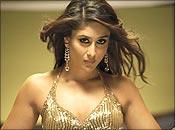 Kareena has that same quality. Maybe because of the family that she comes from, maybe because of a certain innate sophistication she has, maybe also because she is relatively under-exposed -- in the sense that you don't see her everywhere, she is not that public, she has a private side to her that we don't know about, that she does not share -- maybe because of all this, she has the knack of being able to carry off almost anything without ever looking vulgar.
Kareena has that same quality. Maybe because of the family that she comes from, maybe because of a certain innate sophistication she has, maybe also because she is relatively under-exposed -- in the sense that you don't see her everywhere, she is not that public, she has a private side to her that we don't know about, that she does not share -- maybe because of all this, she has the knack of being able to carry off almost anything without ever looking vulgar.
So that was the thing that I found common between the two, the reason why I thought she would be right for the role. Because regardless of what she would be doing in that room -- seducing Shah Rukh, jumping all over him -- somehow you will never associate it with vulgarity, you will never think she is cheap, so that was the thought process behind that casting.
'I will always be remembered for Don'
After assisting director Manoj Kumar, he finally directed a film. His only film. Starring Amitabh Bachchan and Zeenat Aman, it was called, simply, Don. |
'I am sure Farhan will make a good film' How did you first react to the news that Don was to be remade? To begin with, I didn't get as much media attention while working on the original film in 1978! It has turned into a cult film, and everyone now wants to know more about it. I am very happy that Farhan Akhtar is working on a remake. I feel as if I am being rewarded for work I did 28 years ago. Did you like the promos of Shah Rukh Khan's Don? Farhan and his producers took a No Objection Certificate from me before going ahead with their film. He told me he would give the film a new look. I like Farhan's work; I liked his Dil Chahta Hai. People are expecting too much from the new Don though.I am sure Farhan will make a good film. Filmmaking is all about storytelling and one shouldn't discourage those who want to try something different. Compared to what you feel now, what was it like when Don was to be released in 1978? Don was to hit screens on May 12, 1978. Two weeks before that date, Yash Chopra's Trishul was released and became a big hit. We had no money to promote Don because the producer Nariman Irani died six months before the release. There were other films out at around the same time -- including Satyajit Ray's Shatranj Ke Khiladi, Satyam Shivam Sundaram and Prakash Mehra's Muqaddar Ka Sikandar -- and I, as a debutant director, was a dwarf compared to them.Moreover, Don was the only Amitabh film with him as the lead; his other projects were all multi-starrers. So, I was obviously nervous. |
'In those days, people used to care about others. Today, everything is about business' It must have been hard releasing the film after the producer was no more... In fact, we made Don to bail producer Nariman Irani from debt. He was a cinematographer with actor-director Manoj Kumar. He produced his first film Zindagi Zindagi with Sunil Dutt, which flopped badly. He was in debt so, as his friends, we decided to bail him out. Amitabh Bachchan, Pran, Salim-Javed and Zeenat Aman came forward to make a film. It took three years and six months to make Don. There were tremendous budget constraints, but we knew we had to make a good film.At the time, Irani was shooting for a film at Rajkamal Studios in Mumbai. It was November and there was a sudden cloudburst. A wall fell on him while he was preparing to take a shot. He was hospitalised, but passed away soon after. How did the rest of you manage? What was your budget like?Don was shot with a budget of around Rs 25 lakh. After Nariman Irani's death, we somehow managed to wrap the film without any money for promotion. When it became a big hit, we gave the money to Salma Irani, the producer's widow, to settle her husband's debts. In those days, people used to care about others. There were values. Today, everything is about business. Films are now released with 800 to 1,000 prints and shown for just two weeks before being declared hits. In those days, we released only 120 prints. We cared for people in the industry and loved each other like family members. |
'I have always loved fast cars, women and action' Do you remember the day Don was released? It was a big disappointment and declared a flop because not many people turned up. Luckily for me, within a week, the song Khaike Paan Banaraswala became a big hit. Word of mouth publicity led to the film becoming a big hit from the second week on. It ran for 50 weeks in all centres and for 75 weeks in Hyderabad. How was Khaike Paan Banaraswala incorporated into the film? One must give credit to music director Babla, the brother of Kalyanji-Anandji, who included the song. Lyricist Sameer's father Anjaan wrote it. I must also thank Manoj Kumar, who told me a song was needed. When he saw it, he said the film was too tight. He said it made taking a toilet break difficult, because the story was so gripping! So, we included that song.Yeh Mera Dil, filmed on Helen, was quite a rage... It was. When Helen danced for that song, she was 40. She did a brilliant job. That song happened because of my fascination for James Bond films. I have always loved fast cars, women and action, which is why I included those elements in Don. |
'Thanks to Farhan, people want me to direct films' Why didn't you make any films after this one? It's a long story. After Don, I had 52 offers from producers. I selected two films. Before working on Don, I worked with Manoj Kumar, whom I used to respect tremendously. I worked on a salary of Rs 457 for nine years, and learnt a lot from his films. I did try making films after Don, but couldn't complete them. I started a film with Dilip Kumar called Master, and another with Sarika called Titli. The first wasn't completed, and Sarika went on to marry. I did complete a Bengali film called Aashrita in 1989, which ran for 69 weeks and made Rs 3.5 crore. But don't you regret not doing more films? How many films did K Asif made? Hardly any, but he will always be known for Mughal-E-Azam. Ramesh Sippy made many films, but will always be remembered as the maker of Sholay. Mehboob made many too, but will always be remembered for Mother India. In the same way, I made one film -- Don -- and will always be remembered for it. Are you in touch with any of today's stars? I don't drink, smoke or attend parties. Despite that, I have been able to stay friends with some people. Jaya Bachchan is like family, as is Dilip Kumar. Thanks to Farhan Akhtar, people are once again showing interest and want me to direct films. I have a couple of offers too. Will you be able to direct another film in these times?When it comes to direction, age does not matter. Raj Kapoor made Ram Teri Ganga Maili when he was over 60. I still sleep for just four hours and watch a lot of films. I learn from them. I also travel a lot and love meeting people. I don't think directing a film will be difficult for me, even today. |













 The year was 1967. The place, Tanzania. Like other African countries troubled by race riots, the country was facing a politically uncertain future. It was then that a young banker called Chandra Barot (right) decided it was time to say goodbye to his motherland.
The year was 1967. The place, Tanzania. Like other African countries troubled by race riots, the country was facing a politically uncertain future. It was then that a young banker called Chandra Barot (right) decided it was time to say goodbye to his motherland. 















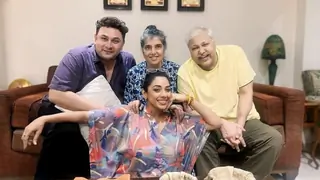









7